SBM3204 - Management Ethics: Analysis of Commonwealth Bank Case Study
VerifiedAdded on 2022/09/23
|9
|2326
|29
Report
AI Summary
This report presents a comprehensive analysis of a management ethics case study, focusing on the Commonwealth Bank's violations of transaction monitoring laws in 2017. The paper explores the significance of ethical practices in modern business, highlighting their role in corporate image, employee accountability, and financial stability. The case study details the bank's failure to prevent money laundering and report suspicious activities, leading to regulatory actions and reputational damage. The analysis applies three ethical perspectives: Individualism, Kantianism, and Utilitarianism, to evaluate the bank's actions and their consequences. The report discusses the impact of the case on various stakeholders, including executives, employees, and shareholders, emphasizing the importance of ethical conduct and strict adherence to financial regulations. The document also references relevant literature and legal frameworks, providing a well-rounded understanding of the ethical challenges and their implications in the banking sector.
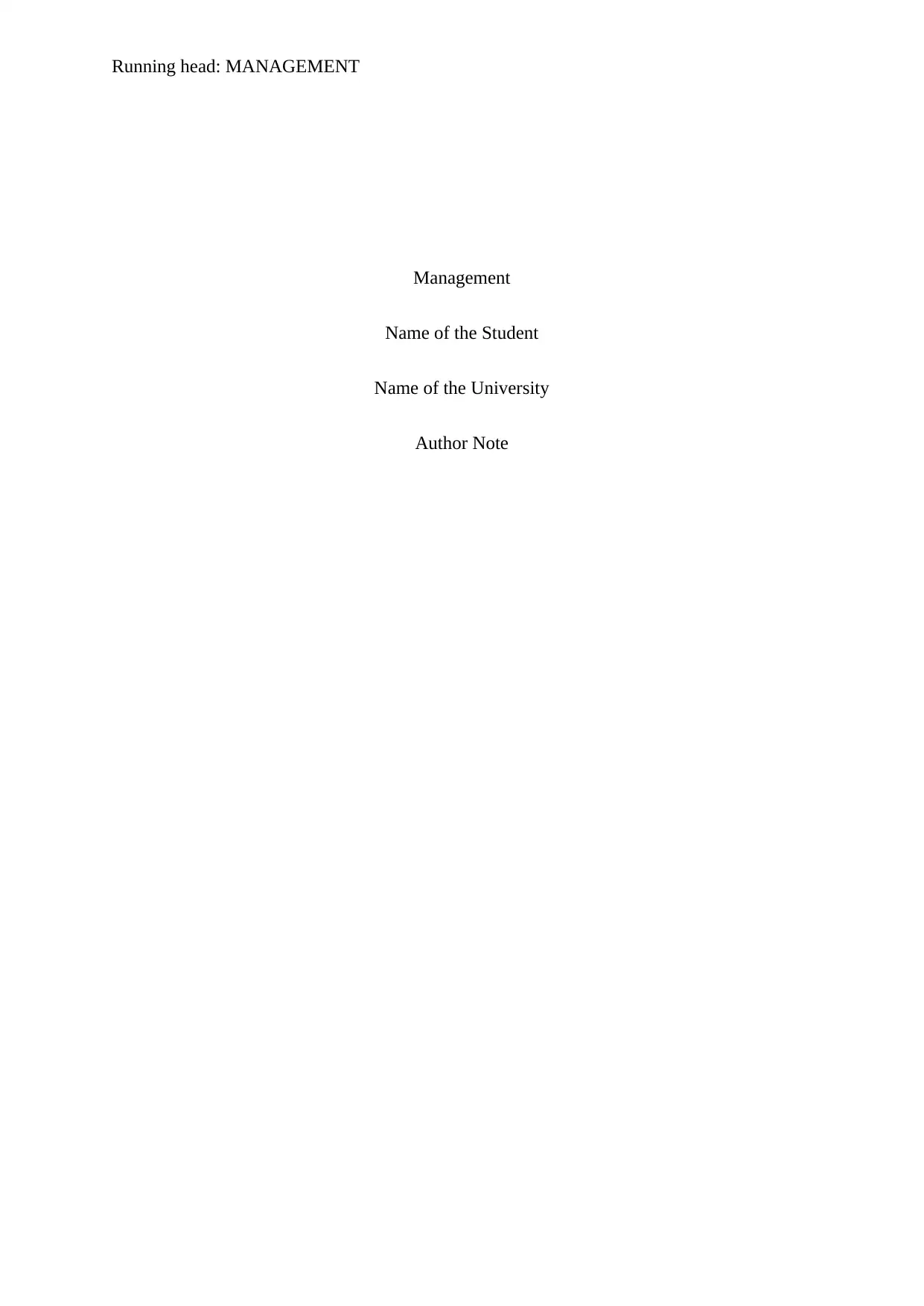
Running head: MANAGEMENT
Management
Name of the Student
Name of the University
Author Note
Management
Name of the Student
Name of the University
Author Note
Paraphrase This Document
Need a fresh take? Get an instant paraphrase of this document with our AI Paraphraser
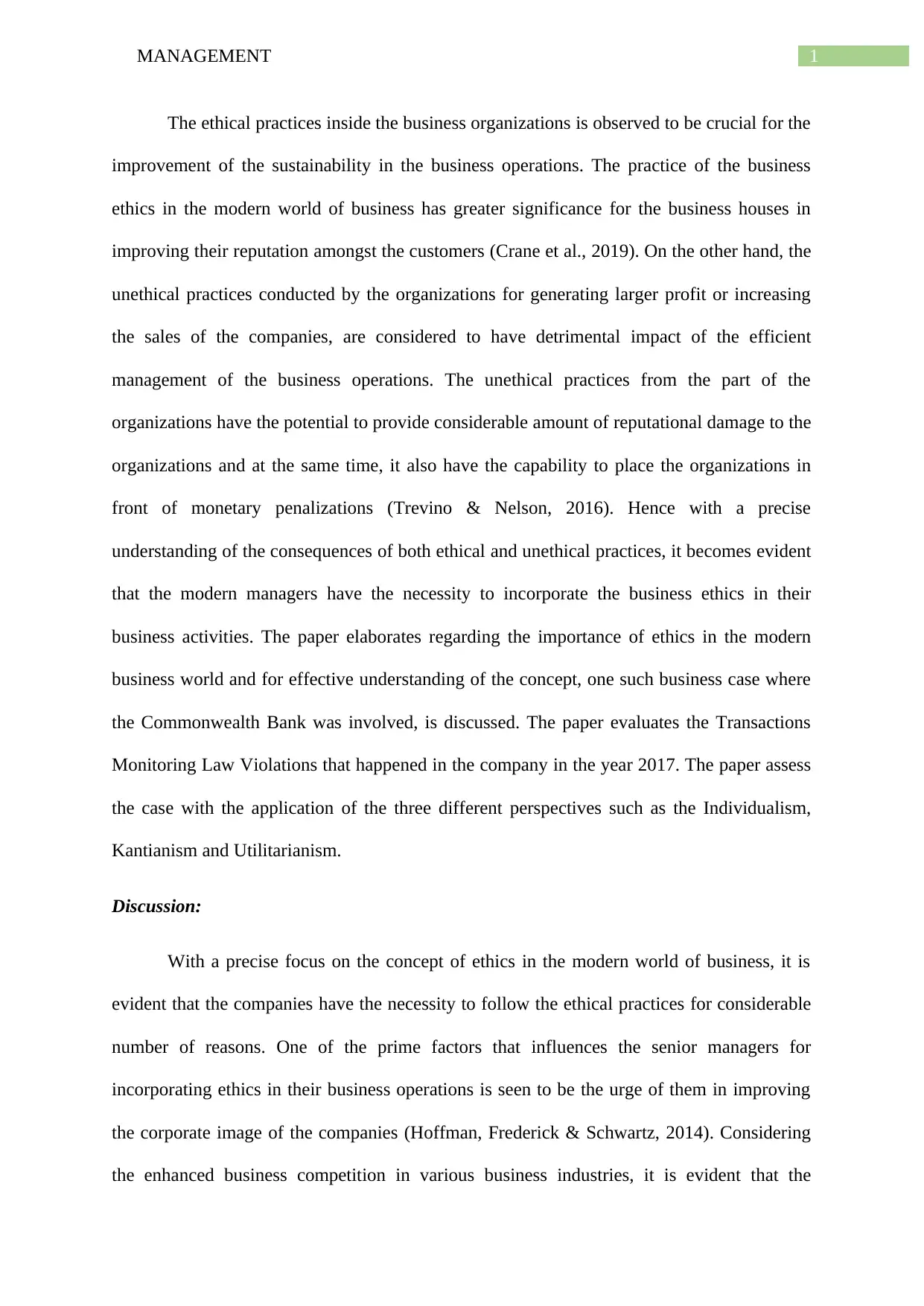
1MANAGEMENT
The ethical practices inside the business organizations is observed to be crucial for the
improvement of the sustainability in the business operations. The practice of the business
ethics in the modern world of business has greater significance for the business houses in
improving their reputation amongst the customers (Crane et al., 2019). On the other hand, the
unethical practices conducted by the organizations for generating larger profit or increasing
the sales of the companies, are considered to have detrimental impact of the efficient
management of the business operations. The unethical practices from the part of the
organizations have the potential to provide considerable amount of reputational damage to the
organizations and at the same time, it also have the capability to place the organizations in
front of monetary penalizations (Trevino & Nelson, 2016). Hence with a precise
understanding of the consequences of both ethical and unethical practices, it becomes evident
that the modern managers have the necessity to incorporate the business ethics in their
business activities. The paper elaborates regarding the importance of ethics in the modern
business world and for effective understanding of the concept, one such business case where
the Commonwealth Bank was involved, is discussed. The paper evaluates the Transactions
Monitoring Law Violations that happened in the company in the year 2017. The paper assess
the case with the application of the three different perspectives such as the Individualism,
Kantianism and Utilitarianism.
Discussion:
With a precise focus on the concept of ethics in the modern world of business, it is
evident that the companies have the necessity to follow the ethical practices for considerable
number of reasons. One of the prime factors that influences the senior managers for
incorporating ethics in their business operations is seen to be the urge of them in improving
the corporate image of the companies (Hoffman, Frederick & Schwartz, 2014). Considering
the enhanced business competition in various business industries, it is evident that the
The ethical practices inside the business organizations is observed to be crucial for the
improvement of the sustainability in the business operations. The practice of the business
ethics in the modern world of business has greater significance for the business houses in
improving their reputation amongst the customers (Crane et al., 2019). On the other hand, the
unethical practices conducted by the organizations for generating larger profit or increasing
the sales of the companies, are considered to have detrimental impact of the efficient
management of the business operations. The unethical practices from the part of the
organizations have the potential to provide considerable amount of reputational damage to the
organizations and at the same time, it also have the capability to place the organizations in
front of monetary penalizations (Trevino & Nelson, 2016). Hence with a precise
understanding of the consequences of both ethical and unethical practices, it becomes evident
that the modern managers have the necessity to incorporate the business ethics in their
business activities. The paper elaborates regarding the importance of ethics in the modern
business world and for effective understanding of the concept, one such business case where
the Commonwealth Bank was involved, is discussed. The paper evaluates the Transactions
Monitoring Law Violations that happened in the company in the year 2017. The paper assess
the case with the application of the three different perspectives such as the Individualism,
Kantianism and Utilitarianism.
Discussion:
With a precise focus on the concept of ethics in the modern world of business, it is
evident that the companies have the necessity to follow the ethical practices for considerable
number of reasons. One of the prime factors that influences the senior managers for
incorporating ethics in their business operations is seen to be the urge of them in improving
the corporate image of the companies (Hoffman, Frederick & Schwartz, 2014). Considering
the enhanced business competition in various business industries, it is evident that the
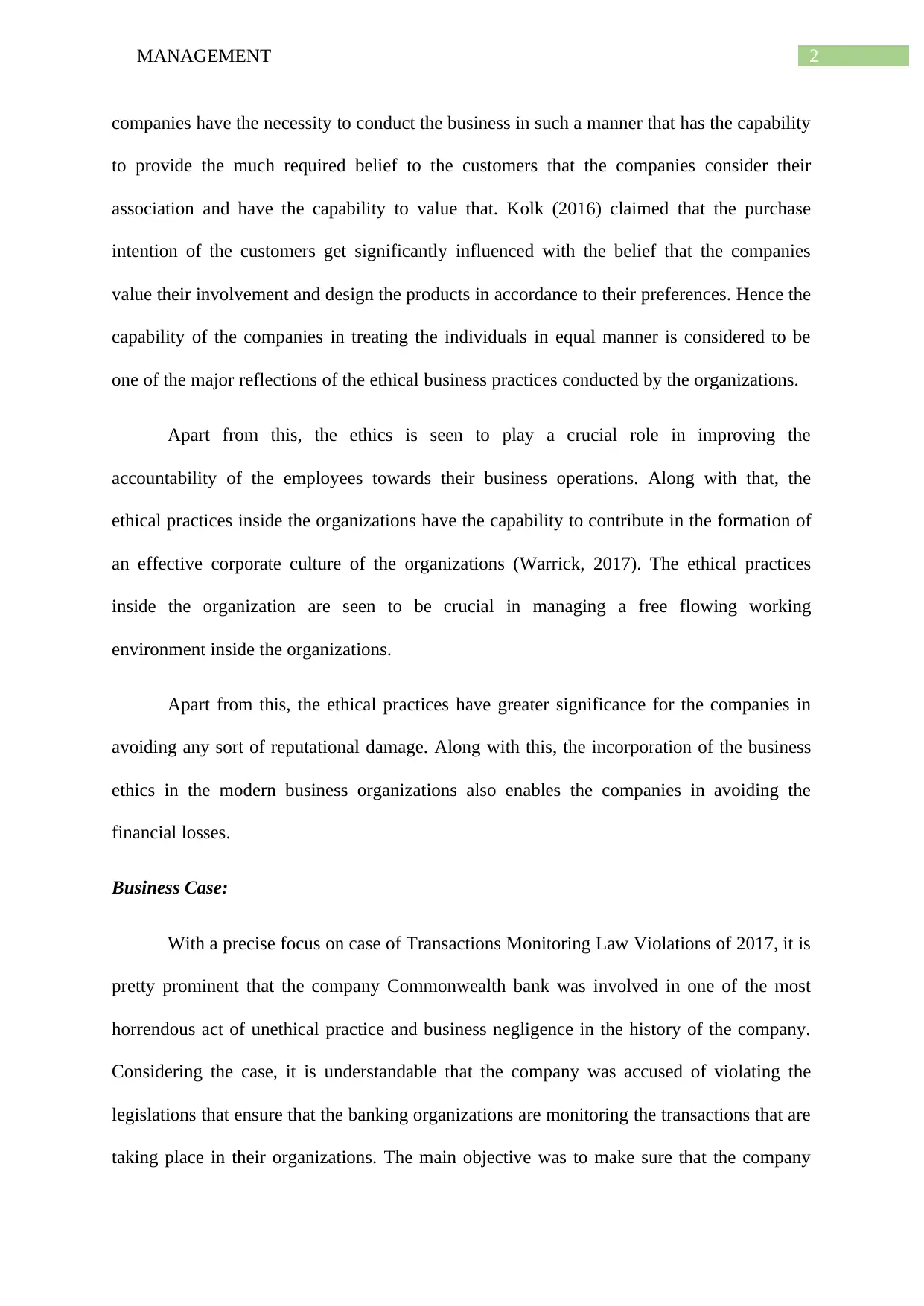
2MANAGEMENT
companies have the necessity to conduct the business in such a manner that has the capability
to provide the much required belief to the customers that the companies consider their
association and have the capability to value that. Kolk (2016) claimed that the purchase
intention of the customers get significantly influenced with the belief that the companies
value their involvement and design the products in accordance to their preferences. Hence the
capability of the companies in treating the individuals in equal manner is considered to be
one of the major reflections of the ethical business practices conducted by the organizations.
Apart from this, the ethics is seen to play a crucial role in improving the
accountability of the employees towards their business operations. Along with that, the
ethical practices inside the organizations have the capability to contribute in the formation of
an effective corporate culture of the organizations (Warrick, 2017). The ethical practices
inside the organization are seen to be crucial in managing a free flowing working
environment inside the organizations.
Apart from this, the ethical practices have greater significance for the companies in
avoiding any sort of reputational damage. Along with this, the incorporation of the business
ethics in the modern business organizations also enables the companies in avoiding the
financial losses.
Business Case:
With a precise focus on case of Transactions Monitoring Law Violations of 2017, it is
pretty prominent that the company Commonwealth bank was involved in one of the most
horrendous act of unethical practice and business negligence in the history of the company.
Considering the case, it is understandable that the company was accused of violating the
legislations that ensure that the banking organizations are monitoring the transactions that are
taking place in their organizations. The main objective was to make sure that the company
companies have the necessity to conduct the business in such a manner that has the capability
to provide the much required belief to the customers that the companies consider their
association and have the capability to value that. Kolk (2016) claimed that the purchase
intention of the customers get significantly influenced with the belief that the companies
value their involvement and design the products in accordance to their preferences. Hence the
capability of the companies in treating the individuals in equal manner is considered to be
one of the major reflections of the ethical business practices conducted by the organizations.
Apart from this, the ethics is seen to play a crucial role in improving the
accountability of the employees towards their business operations. Along with that, the
ethical practices inside the organizations have the capability to contribute in the formation of
an effective corporate culture of the organizations (Warrick, 2017). The ethical practices
inside the organization are seen to be crucial in managing a free flowing working
environment inside the organizations.
Apart from this, the ethical practices have greater significance for the companies in
avoiding any sort of reputational damage. Along with this, the incorporation of the business
ethics in the modern business organizations also enables the companies in avoiding the
financial losses.
Business Case:
With a precise focus on case of Transactions Monitoring Law Violations of 2017, it is
pretty prominent that the company Commonwealth bank was involved in one of the most
horrendous act of unethical practice and business negligence in the history of the company.
Considering the case, it is understandable that the company was accused of violating the
legislations that ensure that the banking organizations are monitoring the transactions that are
taking place in their organizations. The main objective was to make sure that the company
⊘ This is a preview!⊘
Do you want full access?
Subscribe today to unlock all pages.

Trusted by 1+ million students worldwide
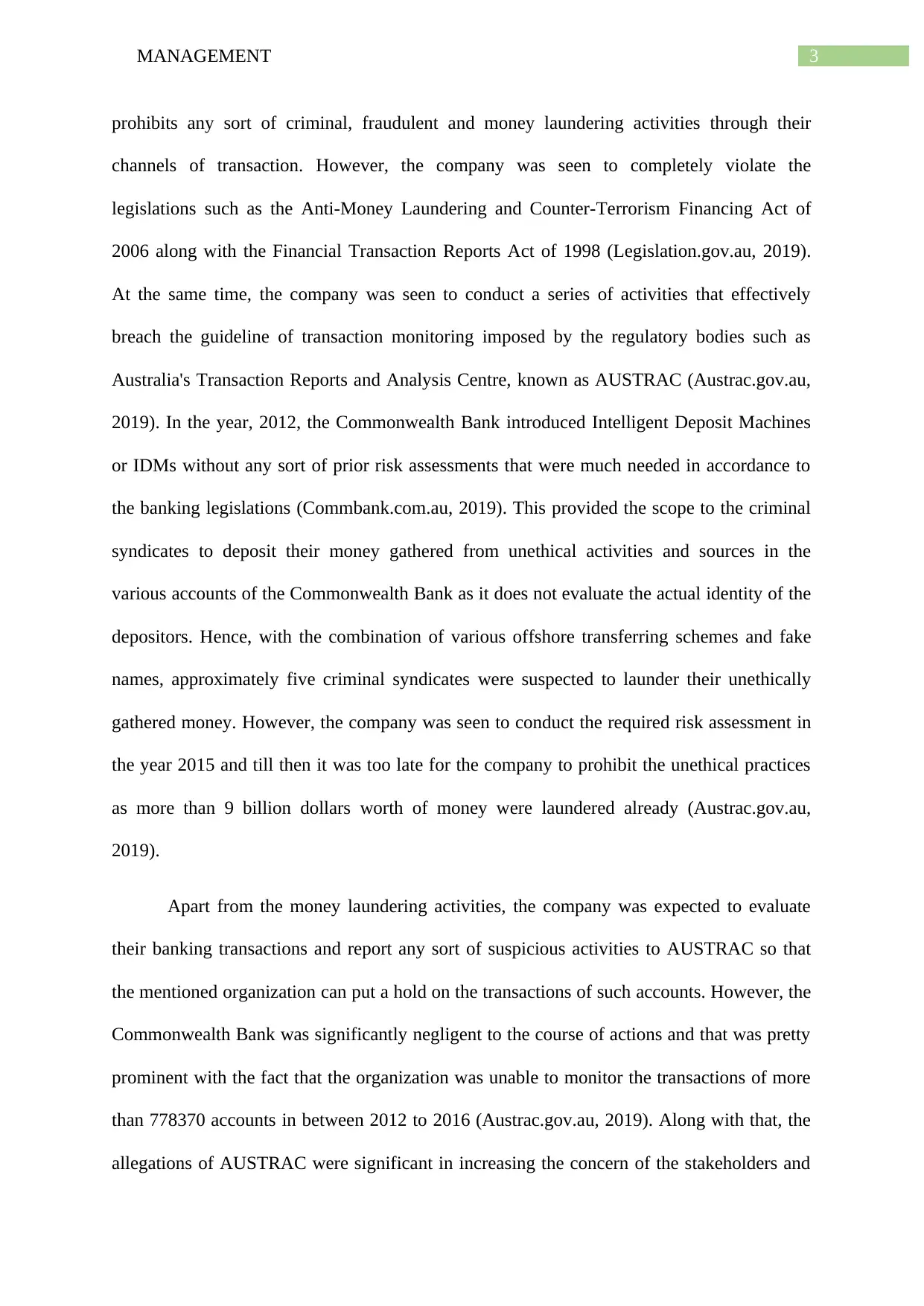
3MANAGEMENT
prohibits any sort of criminal, fraudulent and money laundering activities through their
channels of transaction. However, the company was seen to completely violate the
legislations such as the Anti-Money Laundering and Counter-Terrorism Financing Act of
2006 along with the Financial Transaction Reports Act of 1998 (Legislation.gov.au, 2019).
At the same time, the company was seen to conduct a series of activities that effectively
breach the guideline of transaction monitoring imposed by the regulatory bodies such as
Australia's Transaction Reports and Analysis Centre, known as AUSTRAC (Austrac.gov.au,
2019). In the year, 2012, the Commonwealth Bank introduced Intelligent Deposit Machines
or IDMs without any sort of prior risk assessments that were much needed in accordance to
the banking legislations (Commbank.com.au, 2019). This provided the scope to the criminal
syndicates to deposit their money gathered from unethical activities and sources in the
various accounts of the Commonwealth Bank as it does not evaluate the actual identity of the
depositors. Hence, with the combination of various offshore transferring schemes and fake
names, approximately five criminal syndicates were suspected to launder their unethically
gathered money. However, the company was seen to conduct the required risk assessment in
the year 2015 and till then it was too late for the company to prohibit the unethical practices
as more than 9 billion dollars worth of money were laundered already (Austrac.gov.au,
2019).
Apart from the money laundering activities, the company was expected to evaluate
their banking transactions and report any sort of suspicious activities to AUSTRAC so that
the mentioned organization can put a hold on the transactions of such accounts. However, the
Commonwealth Bank was significantly negligent to the course of actions and that was pretty
prominent with the fact that the organization was unable to monitor the transactions of more
than 778370 accounts in between 2012 to 2016 (Austrac.gov.au, 2019). Along with that, the
allegations of AUSTRAC were significant in increasing the concern of the stakeholders and
prohibits any sort of criminal, fraudulent and money laundering activities through their
channels of transaction. However, the company was seen to completely violate the
legislations such as the Anti-Money Laundering and Counter-Terrorism Financing Act of
2006 along with the Financial Transaction Reports Act of 1998 (Legislation.gov.au, 2019).
At the same time, the company was seen to conduct a series of activities that effectively
breach the guideline of transaction monitoring imposed by the regulatory bodies such as
Australia's Transaction Reports and Analysis Centre, known as AUSTRAC (Austrac.gov.au,
2019). In the year, 2012, the Commonwealth Bank introduced Intelligent Deposit Machines
or IDMs without any sort of prior risk assessments that were much needed in accordance to
the banking legislations (Commbank.com.au, 2019). This provided the scope to the criminal
syndicates to deposit their money gathered from unethical activities and sources in the
various accounts of the Commonwealth Bank as it does not evaluate the actual identity of the
depositors. Hence, with the combination of various offshore transferring schemes and fake
names, approximately five criminal syndicates were suspected to launder their unethically
gathered money. However, the company was seen to conduct the required risk assessment in
the year 2015 and till then it was too late for the company to prohibit the unethical practices
as more than 9 billion dollars worth of money were laundered already (Austrac.gov.au,
2019).
Apart from the money laundering activities, the company was expected to evaluate
their banking transactions and report any sort of suspicious activities to AUSTRAC so that
the mentioned organization can put a hold on the transactions of such accounts. However, the
Commonwealth Bank was significantly negligent to the course of actions and that was pretty
prominent with the fact that the organization was unable to monitor the transactions of more
than 778370 accounts in between 2012 to 2016 (Austrac.gov.au, 2019). Along with that, the
allegations of AUSTRAC were significant in increasing the concern of the stakeholders and
Paraphrase This Document
Need a fresh take? Get an instant paraphrase of this document with our AI Paraphraser
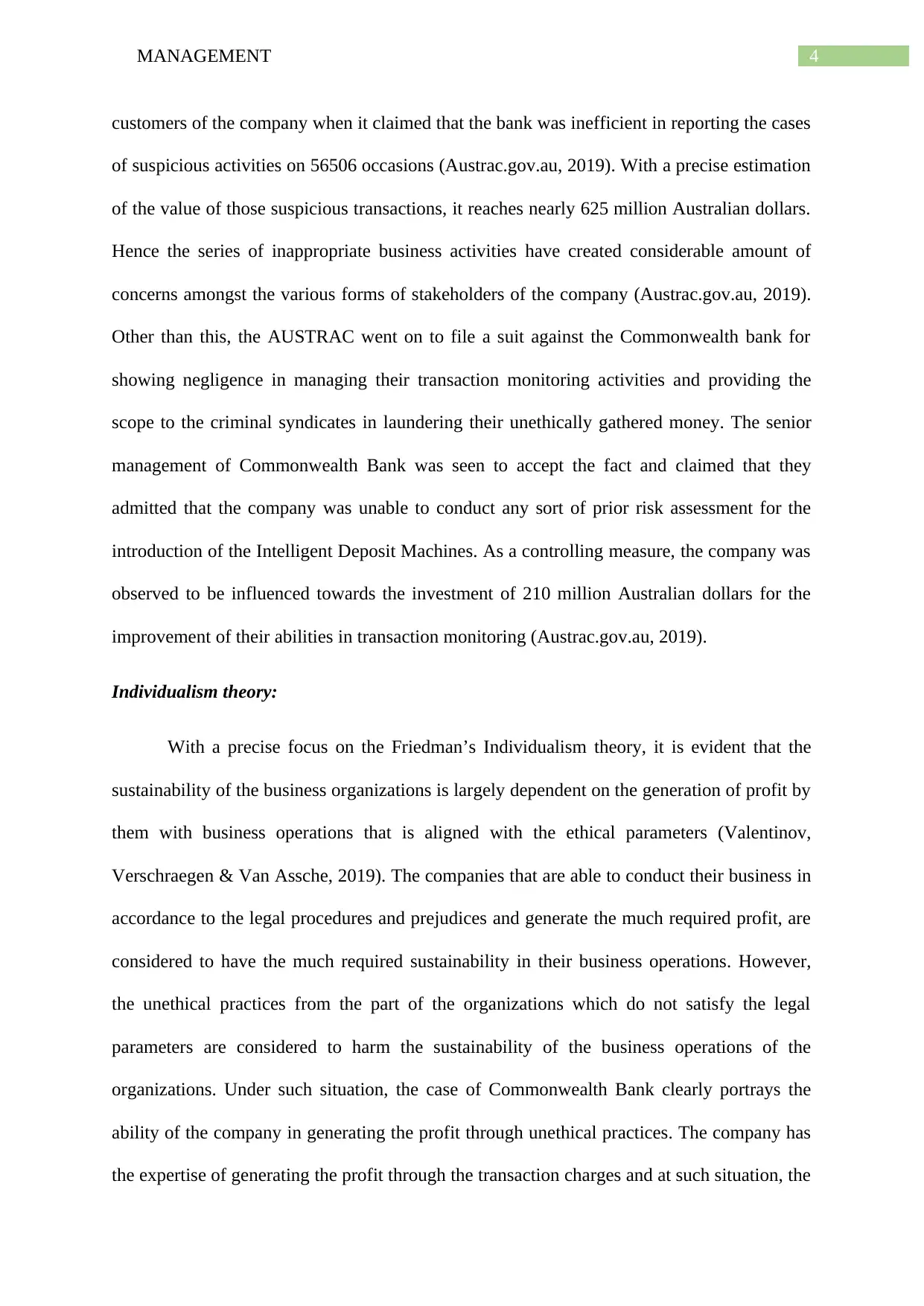
4MANAGEMENT
customers of the company when it claimed that the bank was inefficient in reporting the cases
of suspicious activities on 56506 occasions (Austrac.gov.au, 2019). With a precise estimation
of the value of those suspicious transactions, it reaches nearly 625 million Australian dollars.
Hence the series of inappropriate business activities have created considerable amount of
concerns amongst the various forms of stakeholders of the company (Austrac.gov.au, 2019).
Other than this, the AUSTRAC went on to file a suit against the Commonwealth bank for
showing negligence in managing their transaction monitoring activities and providing the
scope to the criminal syndicates in laundering their unethically gathered money. The senior
management of Commonwealth Bank was seen to accept the fact and claimed that they
admitted that the company was unable to conduct any sort of prior risk assessment for the
introduction of the Intelligent Deposit Machines. As a controlling measure, the company was
observed to be influenced towards the investment of 210 million Australian dollars for the
improvement of their abilities in transaction monitoring (Austrac.gov.au, 2019).
Individualism theory:
With a precise focus on the Friedman’s Individualism theory, it is evident that the
sustainability of the business organizations is largely dependent on the generation of profit by
them with business operations that is aligned with the ethical parameters (Valentinov,
Verschraegen & Van Assche, 2019). The companies that are able to conduct their business in
accordance to the legal procedures and prejudices and generate the much required profit, are
considered to have the much required sustainability in their business operations. However,
the unethical practices from the part of the organizations which do not satisfy the legal
parameters are considered to harm the sustainability of the business operations of the
organizations. Under such situation, the case of Commonwealth Bank clearly portrays the
ability of the company in generating the profit through unethical practices. The company has
the expertise of generating the profit through the transaction charges and at such situation, the
customers of the company when it claimed that the bank was inefficient in reporting the cases
of suspicious activities on 56506 occasions (Austrac.gov.au, 2019). With a precise estimation
of the value of those suspicious transactions, it reaches nearly 625 million Australian dollars.
Hence the series of inappropriate business activities have created considerable amount of
concerns amongst the various forms of stakeholders of the company (Austrac.gov.au, 2019).
Other than this, the AUSTRAC went on to file a suit against the Commonwealth bank for
showing negligence in managing their transaction monitoring activities and providing the
scope to the criminal syndicates in laundering their unethically gathered money. The senior
management of Commonwealth Bank was seen to accept the fact and claimed that they
admitted that the company was unable to conduct any sort of prior risk assessment for the
introduction of the Intelligent Deposit Machines. As a controlling measure, the company was
observed to be influenced towards the investment of 210 million Australian dollars for the
improvement of their abilities in transaction monitoring (Austrac.gov.au, 2019).
Individualism theory:
With a precise focus on the Friedman’s Individualism theory, it is evident that the
sustainability of the business organizations is largely dependent on the generation of profit by
them with business operations that is aligned with the ethical parameters (Valentinov,
Verschraegen & Van Assche, 2019). The companies that are able to conduct their business in
accordance to the legal procedures and prejudices and generate the much required profit, are
considered to have the much required sustainability in their business operations. However,
the unethical practices from the part of the organizations which do not satisfy the legal
parameters are considered to harm the sustainability of the business operations of the
organizations. Under such situation, the case of Commonwealth Bank clearly portrays the
ability of the company in generating the profit through unethical practices. The company has
the expertise of generating the profit through the transaction charges and at such situation, the
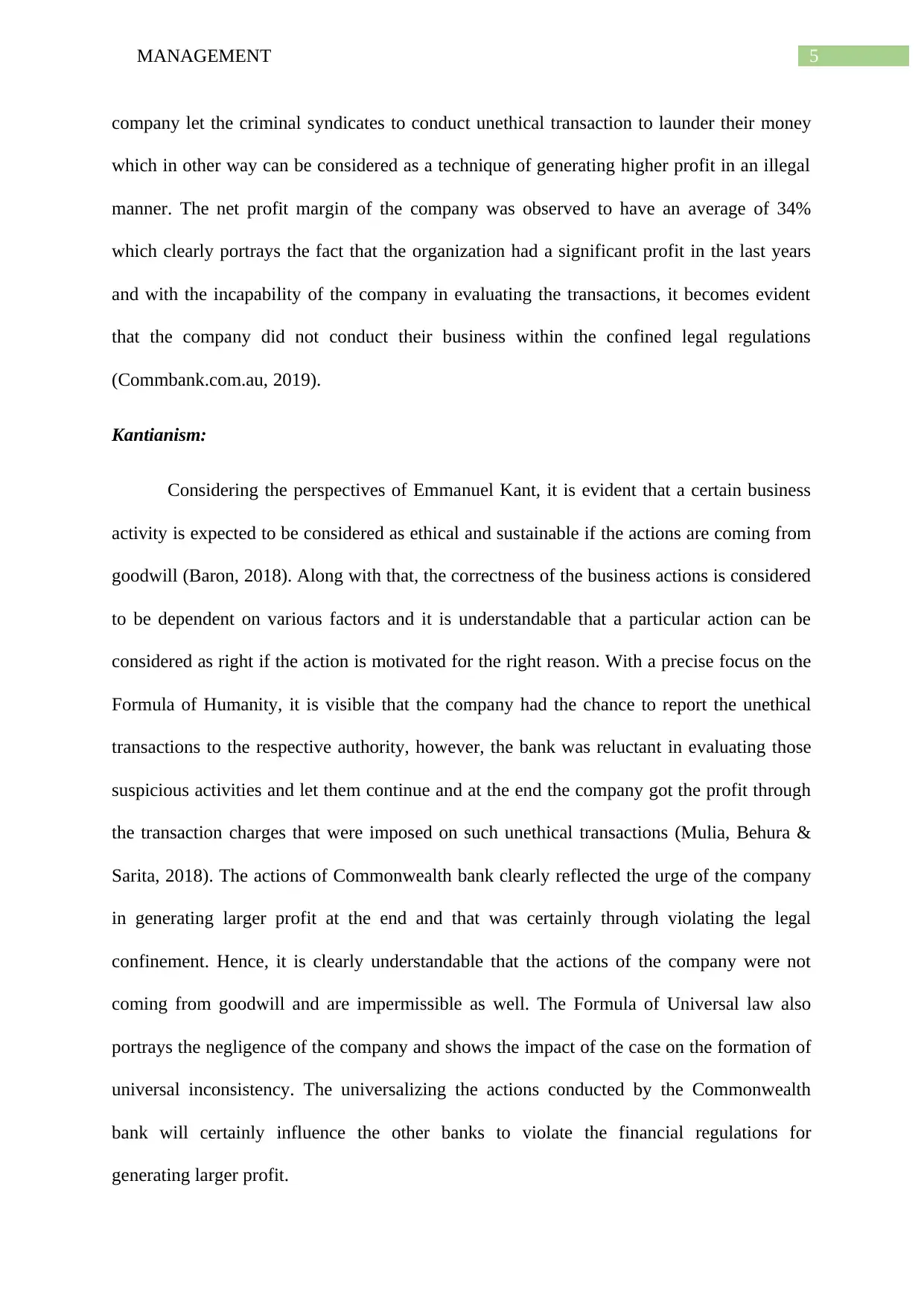
5MANAGEMENT
company let the criminal syndicates to conduct unethical transaction to launder their money
which in other way can be considered as a technique of generating higher profit in an illegal
manner. The net profit margin of the company was observed to have an average of 34%
which clearly portrays the fact that the organization had a significant profit in the last years
and with the incapability of the company in evaluating the transactions, it becomes evident
that the company did not conduct their business within the confined legal regulations
(Commbank.com.au, 2019).
Kantianism:
Considering the perspectives of Emmanuel Kant, it is evident that a certain business
activity is expected to be considered as ethical and sustainable if the actions are coming from
goodwill (Baron, 2018). Along with that, the correctness of the business actions is considered
to be dependent on various factors and it is understandable that a particular action can be
considered as right if the action is motivated for the right reason. With a precise focus on the
Formula of Humanity, it is visible that the company had the chance to report the unethical
transactions to the respective authority, however, the bank was reluctant in evaluating those
suspicious activities and let them continue and at the end the company got the profit through
the transaction charges that were imposed on such unethical transactions (Mulia, Behura &
Sarita, 2018). The actions of Commonwealth bank clearly reflected the urge of the company
in generating larger profit at the end and that was certainly through violating the legal
confinement. Hence, it is clearly understandable that the actions of the company were not
coming from goodwill and are impermissible as well. The Formula of Universal law also
portrays the negligence of the company and shows the impact of the case on the formation of
universal inconsistency. The universalizing the actions conducted by the Commonwealth
bank will certainly influence the other banks to violate the financial regulations for
generating larger profit.
company let the criminal syndicates to conduct unethical transaction to launder their money
which in other way can be considered as a technique of generating higher profit in an illegal
manner. The net profit margin of the company was observed to have an average of 34%
which clearly portrays the fact that the organization had a significant profit in the last years
and with the incapability of the company in evaluating the transactions, it becomes evident
that the company did not conduct their business within the confined legal regulations
(Commbank.com.au, 2019).
Kantianism:
Considering the perspectives of Emmanuel Kant, it is evident that a certain business
activity is expected to be considered as ethical and sustainable if the actions are coming from
goodwill (Baron, 2018). Along with that, the correctness of the business actions is considered
to be dependent on various factors and it is understandable that a particular action can be
considered as right if the action is motivated for the right reason. With a precise focus on the
Formula of Humanity, it is visible that the company had the chance to report the unethical
transactions to the respective authority, however, the bank was reluctant in evaluating those
suspicious activities and let them continue and at the end the company got the profit through
the transaction charges that were imposed on such unethical transactions (Mulia, Behura &
Sarita, 2018). The actions of Commonwealth bank clearly reflected the urge of the company
in generating larger profit at the end and that was certainly through violating the legal
confinement. Hence, it is clearly understandable that the actions of the company were not
coming from goodwill and are impermissible as well. The Formula of Universal law also
portrays the negligence of the company and shows the impact of the case on the formation of
universal inconsistency. The universalizing the actions conducted by the Commonwealth
bank will certainly influence the other banks to violate the financial regulations for
generating larger profit.
⊘ This is a preview!⊘
Do you want full access?
Subscribe today to unlock all pages.

Trusted by 1+ million students worldwide
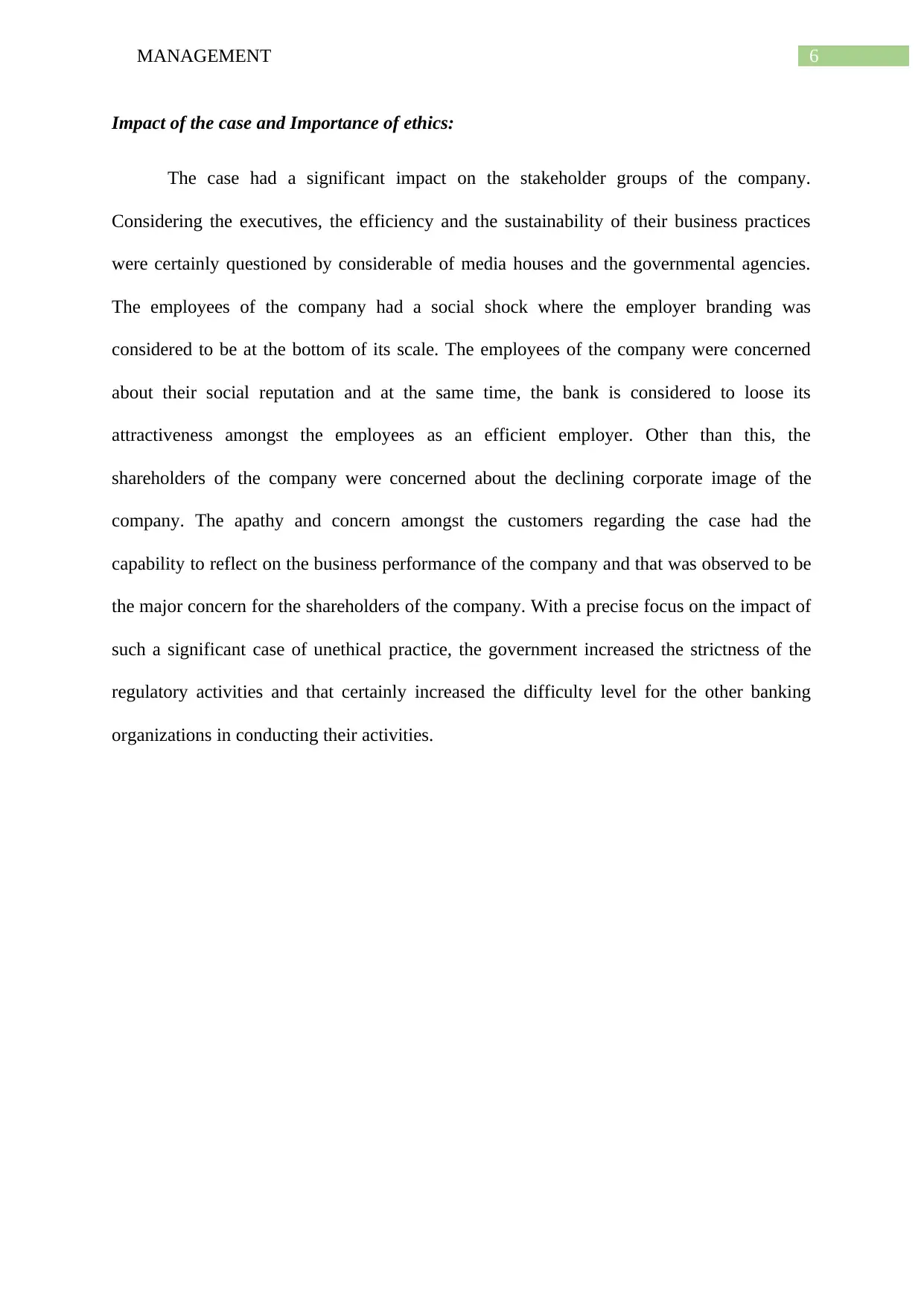
6MANAGEMENT
Impact of the case and Importance of ethics:
The case had a significant impact on the stakeholder groups of the company.
Considering the executives, the efficiency and the sustainability of their business practices
were certainly questioned by considerable of media houses and the governmental agencies.
The employees of the company had a social shock where the employer branding was
considered to be at the bottom of its scale. The employees of the company were concerned
about their social reputation and at the same time, the bank is considered to loose its
attractiveness amongst the employees as an efficient employer. Other than this, the
shareholders of the company were concerned about the declining corporate image of the
company. The apathy and concern amongst the customers regarding the case had the
capability to reflect on the business performance of the company and that was observed to be
the major concern for the shareholders of the company. With a precise focus on the impact of
such a significant case of unethical practice, the government increased the strictness of the
regulatory activities and that certainly increased the difficulty level for the other banking
organizations in conducting their activities.
Impact of the case and Importance of ethics:
The case had a significant impact on the stakeholder groups of the company.
Considering the executives, the efficiency and the sustainability of their business practices
were certainly questioned by considerable of media houses and the governmental agencies.
The employees of the company had a social shock where the employer branding was
considered to be at the bottom of its scale. The employees of the company were concerned
about their social reputation and at the same time, the bank is considered to loose its
attractiveness amongst the employees as an efficient employer. Other than this, the
shareholders of the company were concerned about the declining corporate image of the
company. The apathy and concern amongst the customers regarding the case had the
capability to reflect on the business performance of the company and that was observed to be
the major concern for the shareholders of the company. With a precise focus on the impact of
such a significant case of unethical practice, the government increased the strictness of the
regulatory activities and that certainly increased the difficulty level for the other banking
organizations in conducting their activities.
Paraphrase This Document
Need a fresh take? Get an instant paraphrase of this document with our AI Paraphraser
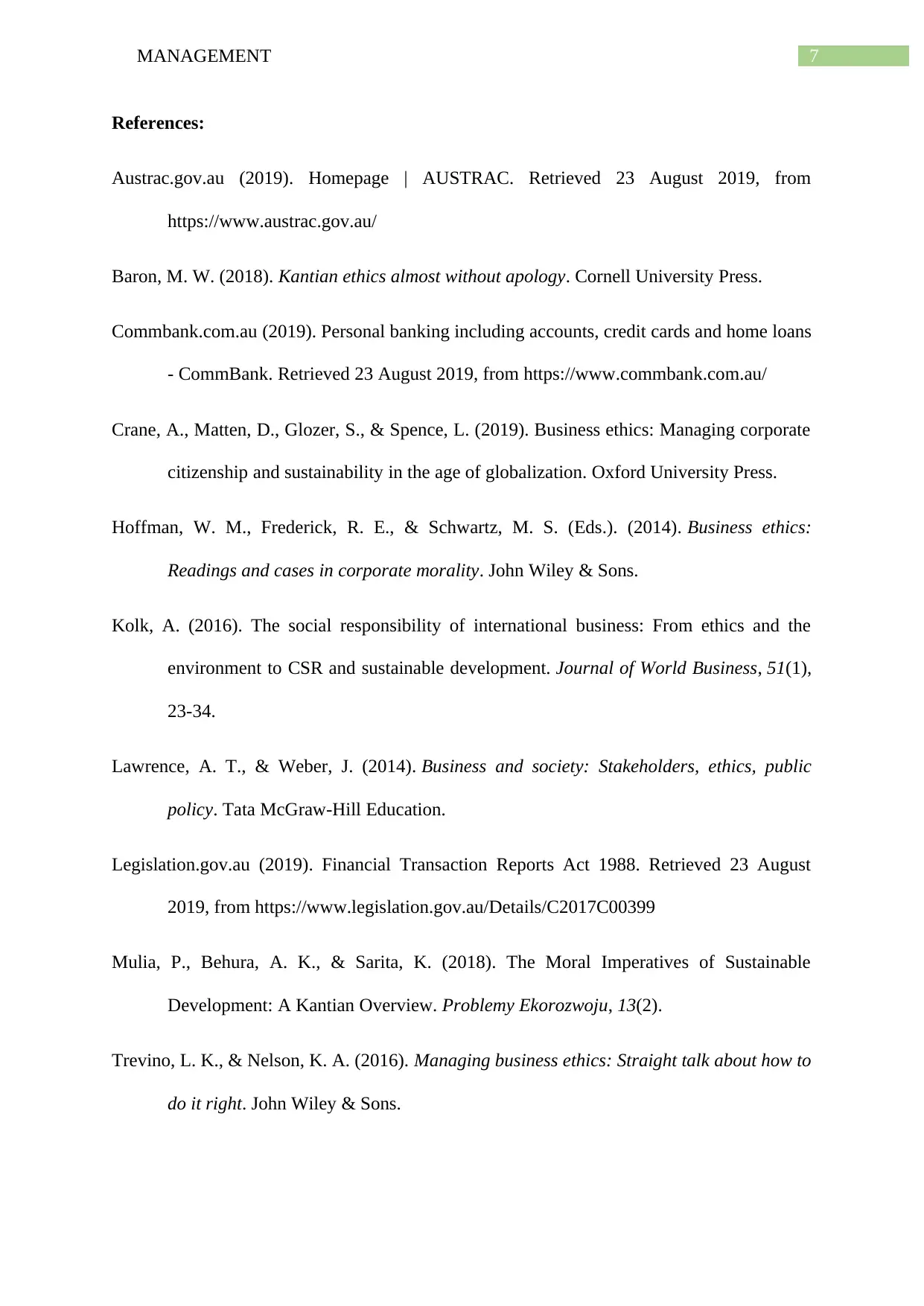
7MANAGEMENT
References:
Austrac.gov.au (2019). Homepage | AUSTRAC. Retrieved 23 August 2019, from
https://www.austrac.gov.au/
Baron, M. W. (2018). Kantian ethics almost without apology. Cornell University Press.
Commbank.com.au (2019). Personal banking including accounts, credit cards and home loans
- CommBank. Retrieved 23 August 2019, from https://www.commbank.com.au/
Crane, A., Matten, D., Glozer, S., & Spence, L. (2019). Business ethics: Managing corporate
citizenship and sustainability in the age of globalization. Oxford University Press.
Hoffman, W. M., Frederick, R. E., & Schwartz, M. S. (Eds.). (2014). Business ethics:
Readings and cases in corporate morality. John Wiley & Sons.
Kolk, A. (2016). The social responsibility of international business: From ethics and the
environment to CSR and sustainable development. Journal of World Business, 51(1),
23-34.
Lawrence, A. T., & Weber, J. (2014). Business and society: Stakeholders, ethics, public
policy. Tata McGraw-Hill Education.
Legislation.gov.au (2019). Financial Transaction Reports Act 1988. Retrieved 23 August
2019, from https://www.legislation.gov.au/Details/C2017C00399
Mulia, P., Behura, A. K., & Sarita, K. (2018). The Moral Imperatives of Sustainable
Development: A Kantian Overview. Problemy Ekorozwoju, 13(2).
Trevino, L. K., & Nelson, K. A. (2016). Managing business ethics: Straight talk about how to
do it right. John Wiley & Sons.
References:
Austrac.gov.au (2019). Homepage | AUSTRAC. Retrieved 23 August 2019, from
https://www.austrac.gov.au/
Baron, M. W. (2018). Kantian ethics almost without apology. Cornell University Press.
Commbank.com.au (2019). Personal banking including accounts, credit cards and home loans
- CommBank. Retrieved 23 August 2019, from https://www.commbank.com.au/
Crane, A., Matten, D., Glozer, S., & Spence, L. (2019). Business ethics: Managing corporate
citizenship and sustainability in the age of globalization. Oxford University Press.
Hoffman, W. M., Frederick, R. E., & Schwartz, M. S. (Eds.). (2014). Business ethics:
Readings and cases in corporate morality. John Wiley & Sons.
Kolk, A. (2016). The social responsibility of international business: From ethics and the
environment to CSR and sustainable development. Journal of World Business, 51(1),
23-34.
Lawrence, A. T., & Weber, J. (2014). Business and society: Stakeholders, ethics, public
policy. Tata McGraw-Hill Education.
Legislation.gov.au (2019). Financial Transaction Reports Act 1988. Retrieved 23 August
2019, from https://www.legislation.gov.au/Details/C2017C00399
Mulia, P., Behura, A. K., & Sarita, K. (2018). The Moral Imperatives of Sustainable
Development: A Kantian Overview. Problemy Ekorozwoju, 13(2).
Trevino, L. K., & Nelson, K. A. (2016). Managing business ethics: Straight talk about how to
do it right. John Wiley & Sons.
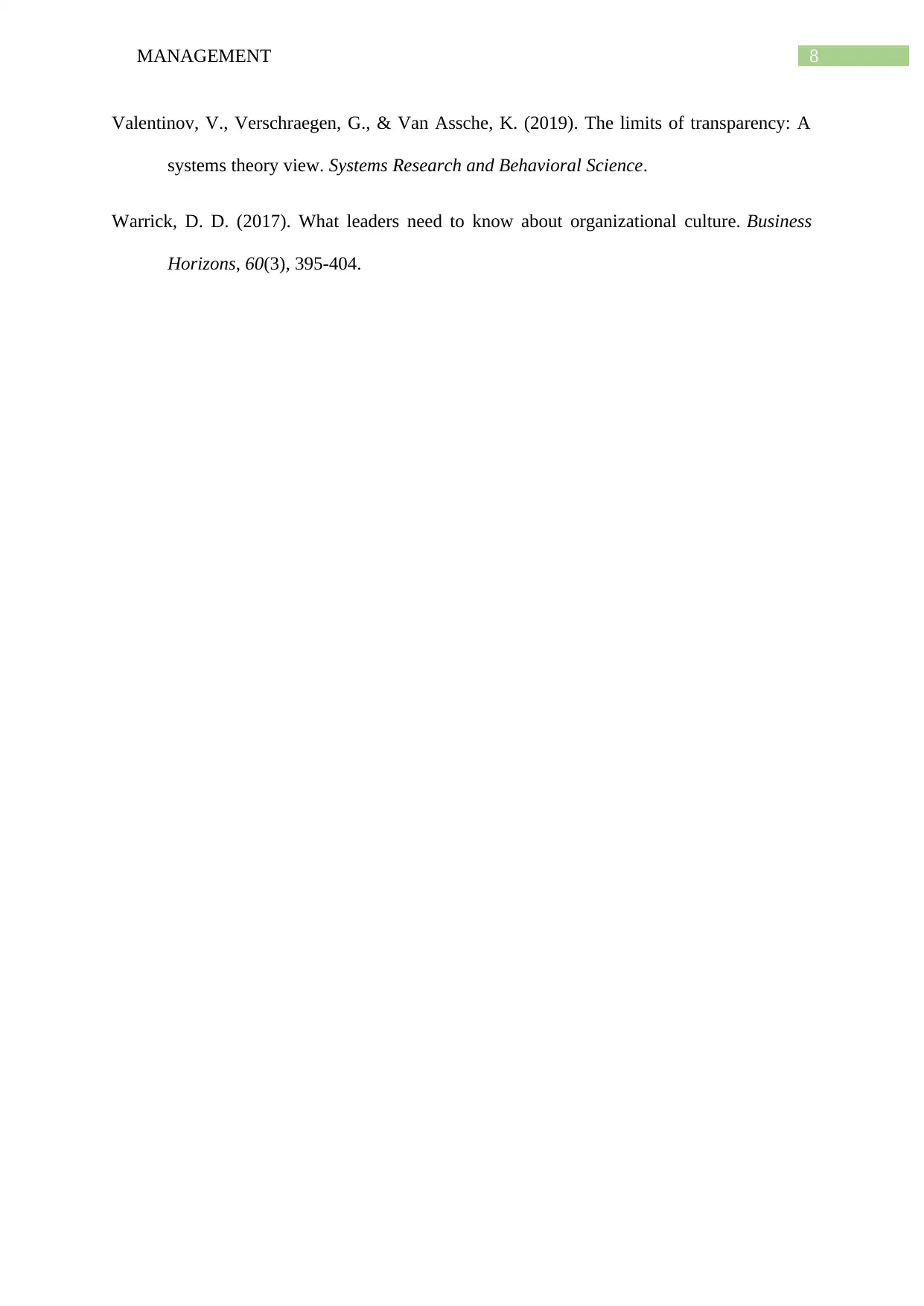
8MANAGEMENT
Valentinov, V., Verschraegen, G., & Van Assche, K. (2019). The limits of transparency: A
systems theory view. Systems Research and Behavioral Science.
Warrick, D. D. (2017). What leaders need to know about organizational culture. Business
Horizons, 60(3), 395-404.
Valentinov, V., Verschraegen, G., & Van Assche, K. (2019). The limits of transparency: A
systems theory view. Systems Research and Behavioral Science.
Warrick, D. D. (2017). What leaders need to know about organizational culture. Business
Horizons, 60(3), 395-404.
⊘ This is a preview!⊘
Do you want full access?
Subscribe today to unlock all pages.

Trusted by 1+ million students worldwide
1 out of 9
Related Documents
Your All-in-One AI-Powered Toolkit for Academic Success.
+13062052269
info@desklib.com
Available 24*7 on WhatsApp / Email
![[object Object]](/_next/static/media/star-bottom.7253800d.svg)
Unlock your academic potential
Copyright © 2020–2026 A2Z Services. All Rights Reserved. Developed and managed by ZUCOL.





